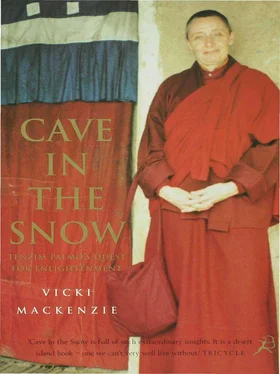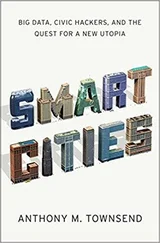‘And that was the Buddha’s great understanding – to realize that the further back we go the more open and empty the quality of our consciousness becomes. Instead of finding some solid little eternal entity, which is “I", we get back to this vast spacious mind which is interconnected with all living beings. In this space you have to ask, where is the “I", and where is the “other”. As long as we are in the realm of duality, there is “I” and “other”. This is our basic delusion – it’s what causes all our problems,’ Tenzin Palmo says with finality. ‘Because of this we have a sense of being very separate. That is our basic ignorance.’
It is quintessential Buddhism – Emptiness, the perennial philosophy – the remedy for all humankind’s woes.
The dialogue from the floor continues: ’This duality, this sense of being separate, is the cause of our fundamental pain, the deep loneliness that human beings feel at the core of their being then?’
‘Of course,’ replies Tenzin Palmo crisply. ‘It creates everything. Ignorance, according to Buddhism, is not ignorance about this or that on an intellectual level – it’s ignorance in the sense of unknowing. We create this sense of an “I” and everything else which is “Non I”. And from that comes this attraction to other “Non I’s” which “I” want, and this aversion to everything I don’t want. This is the source of our greed, our aversion and all the other negative qualities which we have. It all comes from this basic dual misapprehension.
‘Once we realize that the nature of our existence is beyond thought and emotions, that it is incredibly vast and interconnected with all other beings, then the sense of isolation, separation, fear and hopes fall away. It’s a tremendous relief!’ she says. And the audience has to believe her. This is the mystic truth that saints from all religions have discovered – the joy of unity that comes when the ego has been shed.
She pauses again while everyone savours the full extent of what it means to be in this state. ‘The reason we are not Enlightened is because we are lazy,’ she continues, drawing on the discovery she made in the cave of her own greatest ‘failing’. ‘There’s no other reason. We do not bother to bring ourselves back to the present because we’re too fascinated by the games the mind is playing. If one genuinely thinks about Renunciation it is not a giving up of external things like money, leaving home or one’s family. That’s easy. Genuine renunciation is giving up our fond thoughts, all our delight in memories, hopes and daydreams, our mental chatter. To renounce that and stay naked in the present, that is renunciation,’ she says, her words becoming more impassioned.
’The thing is we say we want to be Enlightened, but we don’t really. Only bits of us want to be Enlightened. The ego which thinks how nice, comfortable and pleasant it would be. But to really drop everything and go for it! We could do it in a moment but we don’t do it. And the reason is we are too lazy. We are stopped by fear and lethargy – the great inertia of the mind. The practice is there. Anyone on the Buddhist path certainly knows these things. So how is it we’re not Enlightened? We have no one to blame but ourselves. This is why we stay in Samsara because we always find excuses. Instead we should wake ourselves up. The whole Buddhist path is about waking up. Yet the desire to keep sleeping is so strong. However much we say we will awake in order to help all sentient beings we don’t really want to. We like dreaming.’
It is heartfelt stuff, made all the more potent because everyone present senses she is speaking from experience.
At one of America’s oldest Buddhist establishments, the evocatively named Goat in the Road at Muir Beach, California, she leads a weekend seminar on ‘How to Open the Heart’. It’s a topic she feels particularly strongly about, having experienced a serious lack of warmth in several of the newly opened Western Buddhist centres she’s visited. ‘I walk in and the atmosphere is very heavy, quite cold. I mean, they talk enormously about compassion and Bodhicitta but they have no real kindness in their hearts, even towards each other. Something’s going wrong. The dharma isn’t working as it should. I see people who have been sincerely studying and practising Buddhism for years and they still have the same hang-ups.’
Sitting in front of her sell-out audience, she tries to remedy the situation: ’So often there’s a fundamental division between the practice and ourselves. The practice remains outside of ourselves. It’s very hard for us Westerners to get out of our heads. We approach meditation from the brain only and so we have duality – the subject and the object. The practice has to come down into the heart, it has to go somewhere deep within us. Then there is no subject (me) and object (the meditation).We become the meditation. Then there is a transformation at a very profound level.
‘At the moment we Westerners are looking down into the heart – into the visualizations we are establishing there. What we need to do is to learn to come down into the heart, the seat of our true self. When we indicate “me” we point to our heart, not to our head. It’s instinctual. The problem is that we don’t make that leap into becoming the meditation. That is why we don’t transform. Loving kindness should be so spontaneous that we don’t have to think about it. It’s not a theory, an idea. It’s something you feel. The heart opening up is real,’ she says, almost as a plea.
And then she leads the group in a short meditation. She sits there legs crossed, eyes closed, hands cupped together in her lap, and within seconds a blissful, calm look comes over her face and a small smile plays around her mouth. It’s obvious it’s working, at least for her.
Everywhere she goes people, wanting more of her wisdom, more of her presence, line up to see her. At one event in Madison, New Jersey, she gives interviews for six hours non-stop, with people arriving at fifteen-minute intervals. They come to her with their personal problems, their career dilemmas, their spiritual conundrums, their worries, their woes. She is there for each one of them, listening, dispensing advice, holding their hand, crying when moved. She doesn’t seem to get tired, or impatient. One woman asks how she can reconcile her job in the armed forces with her newly found Buddhist belief in non-violence. A young nun spills out her unhappiness at feeling unsupported in her community. A round-faced monk simply wants to tell her of his own spiritual journey. A middle-aged Californian asks how can she be expected to take responsibility for the welfare of all living beings when she has just spent ten years in therapy learning not to be responsible for her alcoholic mother. A man, worried about the gruesome Tibetan Buddhist teachings of the hell realms, wants to know what Tenzin Palmo thinks happens after death. Her reply reveals that even after decades steeped in Buddhism she has retained her independence of mind.
‘I once tackled a lama about it as by his definition I was definitely going there. “Don’t worry about it,” he laughed while slapping me on the back. “We only say that to get people to behave themselves.” Frankly I don’t think this approach works. We have a hard enough time of it as it is. Frightening people with tales about hell is counter-productive – it just makes them want to give up!’
’The lamas tend to present the after-death state as a reward or punishment for what we have done in this life, which lasts for a certain amount of time until we come back again to Earth and start working for our spiritual development anew,’ she goes on. ‘It’s like we save up our money in this life and then spend it in the next and then have to return to start saving up again. But to me the spiritualist idea is more meaningful. They also believe there are many different dimensions where you can go after death, where you meet up with like-minded people. The difference is that the spiritualists maintain that after death you are able to work helping others who are less fortunate, which creates further spiritual evolution. It’s one of the ways we evolve by cultivating love and compassion even while one is in the spirit realm.’
Читать дальше












